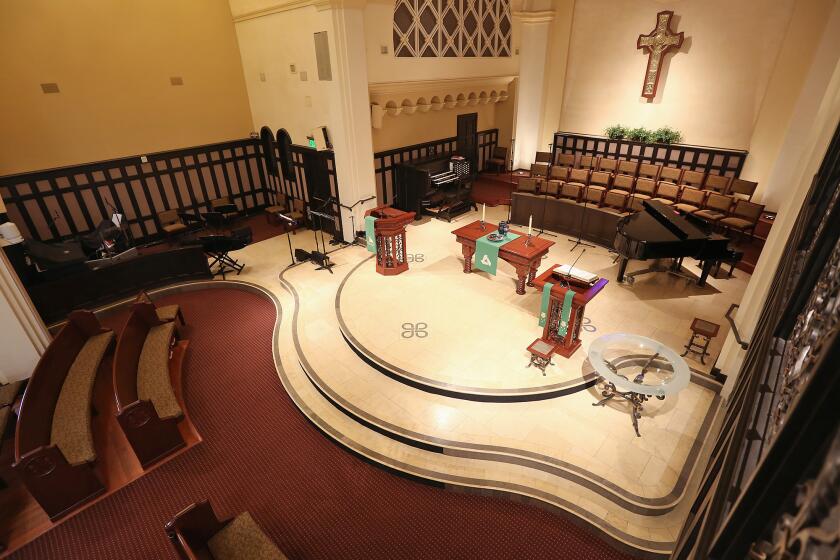Concern remains, strategy changes
Concerned Citizens of Newport Beach, an organization that has avidly opposed the over-concentration of group rehab homes in the city, shifted its purpose and strategy this week by dismissing or settling nearly all its lawsuits with group home operators and instead beginning a charge to replace all the incumbent City Council members running for reelection this November.
“We are going to move to action and devote our resources so we are more focused on community education so we can get the right leadership in control of our local government,” Concerned Citizens leader Denys Oberman said.
The group will devote its resources to preparing and supporting candidates against incumbents Ed Selich, Steve Rosansky and Keith Curry, Oberman said.
Concerned Citizens has yet to formally endorse any candidate, but Oberman said the group already has many members who are supporting Dolores Otting against Curry.
She promised more candidates are to come as the group interviews potential contenders.
“The Concerned Citizens sued the taxpayers of Newport Beach to the tune of $250 million, have counseled us to take an unwise and legally questionable approach to the issue of group homes, and now that their legal strategy has failed, it is not surprising they would latch onto Dolores Otting to advance their aims,” Curry said.
Rosansky also defended his record on the issue, citing numerous efforts he has made to offer solutions, foster discussion and work with both sides to forge compromises.
Rosansky helped organize a conference concerning the issue of group homes that was attended by representatives of more than 100 cities, and he also worked with state Sen. Tom Harman on legislation concerning the issue.
“That conference wouldn’t have happened unless I had made it happen and I thought it was very instructive and valuable, and Oberman attended that conference,” he said. “It strikes me as funny that I am labeled as being anti-resident when I have spent significant time and energy on this issue and I seem to get no credit from the group home activists on that.”
In addition to changing its political aims, Concerned Citizens dropped its lawsuits in hopes it will see the city follow through on its promises concerning group homes, including abatements on those group homes the organization calls illegal, Oberman said.
To date, the group has dismissed lawsuits against six group homes, including Morningside Recovery, Narcanon Southern California, Ocean Recovery, Newport Coast Recovery, Kramer Center and Pacific Shores Recovery.
The group also previously settled with Balboa Horizons Recovery and Miramar Health.
Terms of the settlement were not revealed by Concerned Citizens, and attempts to reach representatives for the group homes were unsuccessful.
The only lawsuit not settled or dismissed is with Sober Living by the Sea.
The group has also kept its $250-million lawsuit against the city intact, but is evaluating its options on the issue.
“We are going to hold the city accountable for fulfilling this responsibility,” Oberman said.
Newport Beach City Manager Homer Bludau said the city has always intended to follow through on its commitments whether Concerned Citizens is watching or not, and welcomes the scrutiny. But Bludau feels the dropping of the lawsuits sends a different message.
“I find it strange that they would drop any legal action against any group homes in order to focus on a political process if they thought the law was with them,” Bludau said. “Why wouldn’t they want their day in court as opposed to getting political? Seems like an indication they don’t have the law on their side.”
Oberman disagrees.
Instead, she sees this as an opportunity for the city to prove it can improve its transparency and discontinue what she calls a pattern of bullying.
While the city has proclaimed its settlement with Sober Living by the Sea as a victory — Curry called it the “strongest and most legally defensible ordinance” against group homes in the state — Oberman thinks officials have actually done very little in terms of solving the issue of over-concentration.
“As of now, the city has not demonstrated they are committed to enforcing the ordinances to the maximum amount allowed by law,” she said.
For that reason, the group is continuing with its lawsuit against the city as it weighs other options. Those options include settling with the city if a suitable offer is made; taking the lawsuit to federal court or another venue; or dismissing the lawsuit outright and continuing to build more political support.
DANIEL TEDFORD may be reached at (714) 966-4632 or at daniel.tedford@latimes.com.
All the latest on Orange County from Orange County.
Get our free TimesOC newsletter.
You may occasionally receive promotional content from the Daily Pilot.



